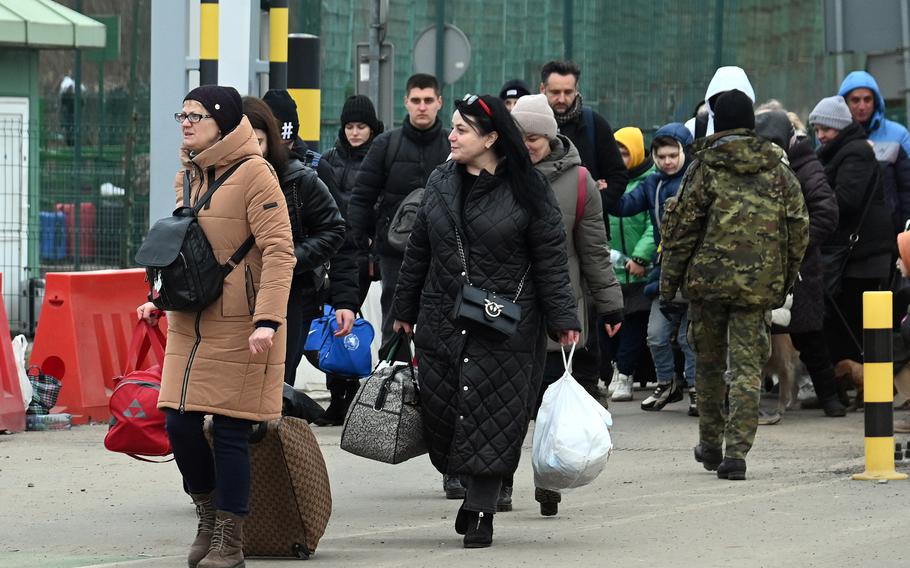
Refugees walk across the Ukrainian-Polish border at Medyka, Poland, in early March 2022. The commander of the U.S. Army garrison in Italy took to social media to warn DOD-affiliated Americans there to think twice about hosting Ukrainian refugees, citing legal issues and risks. (Michael Abrams/Stars and Stripes)
Russian forces killed extrajudicially at least 441 civilians outside of Kyiv, in what likely amounted to war crimes, in the first weeks of the invasion of Ukraine, according to a U.N. report released Thursday. The actual number of civilians summarily killed is likely to be “considerably higher,” the report found.
Based on investigations launched after hundreds of bodies of civilians were found following the Russian retreat from the Kyiv area in early April, the report by the office of the U.N. high commission for human rights documents in brutal detail the violence inflicted on Ukrainians in occupied areas around the capital.
The findings add to mounting evidence that Russian forces have targeted and summarily executed Ukrainian civilians in grave violations of international law.
Witnesses told U.N. investigators that under Russian occupation, anything perceived to constitute support for Ukrainian forces, including camouflage-patterned clothing and text message histories, became grounds for death.
Some civilians killed in makeshift detention facilities were found with their hands bound, with gunshot wounds and injuries suggesting torture, the U.N. found. Others were shot dead in their backyards, in convoys of cars while fleeing, while on bikes or walking to find food or see relatives.
The U.N. investigated extrajudicial killings in 102 villages and towns between Feb. 24, the day Russia invaded, and April 6, when its forces retreated from around Kyiv. Nearly 90 percent of the civilians killed in these cases were men.
Summary executions occurred across the three regions — Kyiv, Chernihiv and Sumy — though U.N. investigators found higher death counts in some cities, such as Bucha, where they documented 73 summary killings of civilians and were working to corroborate 105 more.
In one incident, on March 7, Russian soldiers invaded a home in Bucha and detained a 27-year-old man, according to the report. The mother found her son in the yard of a house the next day: he looked terrified, appeared to have an injured hand and was surrounded by soldiers, who ordered her to stay away, she told U.N. investigators. The day after Russian troops retreated on March 30, she found him in the basement of the house shot dead.
The report highlighted Russia’s “absence of meaningful investigation” into the alleged extrajudicial killings by its soldiers.
As of late September, Ukraine’s prosecutor general registered more than 35,000 allegations of Russian violations of the “the rules of war,” according to the United Nations.
A Ukrainian court in May convicted the first, and so far only, Russian soldier of summarily killing a civilian. International efforts to build war crimes cases are underway, though trials are likely years away.
The report was released as U.N. human rights commissioner Volker Türk traveled in Ukraine. “I have been here now for four days, in sub-zero temperatures,” Türk said in a statement Wednesday. “I have seen for myself the horrors, suffering and the daily toll” on ordinary people.
While the U.N. can investigate atrocities and issue condemnatory General Assembly resolutions, it has not been able to take much substantive action in Ukraine, since Russia holds a veto on the Security Council. At a Security Council meeting this week, Russian and U.S. diplomats accused each other of disinterest in peace talks.
During a televised meeting in Moscow on Wednesday, Russian President Vladimir Putin showed no indication of wanting to end the conflict. The war in Ukraine, which he calls a “special military operation,” would “be a long process,” he said.
After months of veiled nuclear threats, Putin defended Russia’s nuclear policies. While the possibility of nuclear war has risen, “we have not gone crazy, we are aware of what nuclear weapons are,” Putin said, adding that Russia’s nuclear strategy is centered on “retaliatory strikes.”
The meeting, with a “civil society and human rights” council populated with Kremlin loyalists and the leaders of pro-war groups, included some discussion of tough conditions on the front lines as the weather worsens. But Putin said that Russia should dig in for the long haul.
While Russian forces are not thoroughly equipped for the coming cold, much of Ukraine will be forced to face winter with tenuous access to energy. Weeks of targeted attacks have devastated the country’s grid. The Biden administration is set to convene a meeting with oil and gas executives on Thursday to discuss U.S. support for Ukrainian energy infrastructure.
The Washington Post’s Natalia Abbakumova and Mary Ilyushina in Riga, Latvia, and Kelly Kasulis Cho in Seoul contributed to this report.